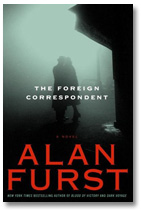Books |
Alan Furst: The Foreign Correspondent
By
Published: Feb 19, 2020
Category:
Fiction
The heroes of international thrillers are usually manly men, built on the John Wayne model. If they have inner lives, they’re in flight from them. Women are simply receptacles; they exist to satisfy whatever needs violence can’t. Or, if the hero is created on the James Bond model, the guy is the sex object, the blonde of the piece. Either way, when the thriller writer is forced to slap up a sex scene, I dissolve in giggles. And I wonder how women can read these books with pleasure.
So let me begin by praising the bedroom scenes in "Foreign Correspondent." They’re so hot that, all by themselves, they’re a reasonable inducement to pick up this novel. And not just for the heat, but for the emotion driving the lust — these are lovers using their bodies to communicate their most urgent, indeed desperate feelings in the face of oncoming war and possible death. They are wonderfully human, perfectly imperfect characters we can care about. And more: They’re so clearly well-matched that we want it to work out for them.
But then, we want it to work out for almost all of the characters in "Foreign Correspondent," which is set, like all of Furst’s books, in Europe on the eve of World War II. These novels are brilliantly researched, artfully plotted and written like crisp journalism — that’s a hat trick. Furst is a master of a genre that is pretty much his own invention: historical fiction set in a thriller frame. [To buy the paperback from Amazon, click here. For the Kindle edition, click here.]
This time out, the main character is Carlo Weisz, who has fled his native Trieste and is now a reporter for Reuters in Paris. He’s also on the editorial board of Liberazione, a Resistance newspaper edited in Paris and distributed in Italy. In the beginning of the book, the head of the paper is assassinated; Weisz is his logical successor.
Weisz is of two minds about Resistance work. On one hand, he agrees with the general idea: "Resist in small ways, this can’t go on, the tables will turn." On the other, he’s a born journalist, more interested in watching and writing than making history. But you know that can’t last. As 1938 becomes 1939, it’s increasingly difficult not to be drawn in.
In Weisz’s case, there’s a personal reason to get involved. In Berlin, he re-connects with Christa Zameny, a former lover, now married. Christa is dabbling in Resistance work, but she has no real idea what danger that holds. Her view of Germany’s destiny: "Hitler will reach too far, and the army will step in." Clearly, there will come a time when getting her out of Germany becomes a priority for her lover. The question then is: Can he make a deal with the people who can engineer her escape? And then, can he live up to its terms?
The plot briskly moves across the Continent. But Furst never fails to take the time — in a well-disciplined phrase or sentence — to share factoids that you’ll want to underline. The writers for Liberazione use the names of composers as pen names; Weisz is Palestrina. There’s a conference of concerned writers. Furst notes drily, "There was a notable absence of Russian writers at the conference, as they were busy mining coal in Siberia or being shot in the Lubyanka." Why was Mussolini so concerned wth getting the trains running on time? Because, in the 1920s, a train headed for Turin arrived 400 hours late.
The character descriptions are just as telling. Doesn’t this just say everything about Weisz: "Once, home, he thought about writing, writing from the heart, for himself, and would’ve worked on the novel in his desk drawer, but for the fact that there was no novel in the drawer." And Furst never fails to describe at least one meal: "rognons de veau, morsels of veal kidney, sauteed with mushrooms in a brown sauce, and a mound of crisp pommes frites."
Weisz mops up the veal sauce with pieces of bread, then orders cheese — vacherin — for dessert. And he cuts "a proper diagonal, not the nose."


